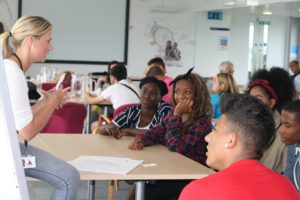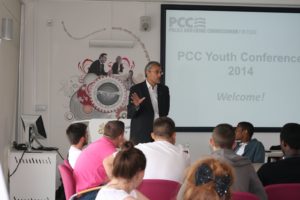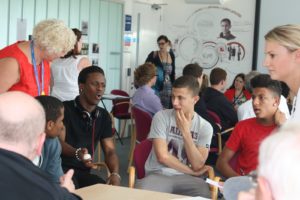PCC invites young people to ‘Be the Change’
Nick Alston, the Police and Crime Commissioner for Essex, hosted his inaugural youth conference on Tuesday July 1, 2014, aimed at gathering the views and concerns of young people from across Essex, and most importantly their ideas about how to solve any issues. He named the event ‘Be the Change’ after Ghandi’s famous quote, because it provided a unique opportunity for young people to drive meaningful change in the decision making around services and issues which affect them.
In total 35 young people, mostly aged between 15 and 18 years old, attended the conference held at the Anglia Ruskin University in Chelmsford. Together they reflected the huge diversity of Essex’s youth community – both geographically and demographically. Amongst this group were young people who are engaged with youth offending teams, involved in youth councils, from schools, and other engagement and diversion schemes. The young people included some who have been witnesses, victims or perpetrators of crime – or, in some cases, all three. The PCC was particularly impressed by and grateful for the diversity and openness of those who chose to participate, many of whom spoke of challenging experiences that they had had, which will continue to inform learning and planning across the partnership.
The conference began with the young people selecting which three of five possible workshop topics they would like to focus on. The five areas were: knife crime; hate crime; drugs and alcohol; bullying & cyber-bullying; and healthy relationships. The overwhelming majority of delegates chose knife crime, hate crime and drugs and alcohol as their workshop topics, which then formed the majority of the afternoon activities.
In opening the event, Nick explained the role and responsibilities of the PCC, and re-iterated his absolute commitment to working with young people to better understand and respond to their concerns, and provide a meaningful opportunity for some of their ideas to become a reality. Having already met with a number of youth groups and visited schools, the PCC said he was delighted to have a representative cross section of young people to help him explore areas of need and concern, and he was determined to continue working with young people.
Reflecting on the event later in the day Nick said: “It is so exciting to have had the opportunity to talk with and listen to so many young people from across the county, all of whom have had such different backgrounds and experiences – but also many of whom actually agree on what matters and what we need to be doing about it. Young people make up a crucial part of our communities, and there is real opportunity here to empower more young people to make change happen through volunteering in all sorts of ways. I think today is the beginning of something really exciting and I’m grateful for all those who gave their time to be with us today.”
Following a question and answer session with police officers, including Insp Matt Bennett and Sgt Jan Bloomfield, which raised some important issues around the relationship between the police and young people, participants took part in a round-robin of workshops on the three main areas of concern they had previously voted on, and two other workshops focused on how young people would like to see the PCC youth engagement programme develop, and what decisions they would make about youth services if they were PCC for the day.
The widespread concern around knife crime became clear when almost all participants in the workshop on that subject said that they knew someone who carried a knife regularly. Many felt that there needed to be much tougher education and awareness in schools and across social networks around the dangers of carrying knives. They felt it was also important to stress that young people who carry a knife are more likely to get injured by one themselves. The issue of reporting that someone they knew was carrying a knife was discussed. Some young people expressed concern at being seen as a ‘snitch’ while others said they didn’t feel it was their business. Many said they would consider anonymous reporting, but very few had heard of Crimestoppers – who were present at the event, and will continue to work with the PCC youth engagement programme to ensure their message reaches more young people.
The hate crime workshop was ably facilitated by Sangita Mittra from New Generation Development Agency (NGDA), bringing extensive experience of working with young people and victims of hate crime to the debate. This workshop generated a lot of emotive discussion for many young people, who felt there is not enough support or education in schools for either students or teachers in how to challenge hate crime and incidents, leaving young victims increasingly vulnerable and without the necessary support or intervention.
Delegates also felt more education was needed for parents and the general public around how to spot hate crime and other forms of bullying, and more education for young people around how to report it and seek help. Ideas were suggested around getting more victims involved in education and awareness-raising for hate crime, which would encourage more people to talk about it and challenge it when they witness it, and reduce the sense of isolation for victims.
Essex young peoples’ Drug and Alcohol Service led the third workshop chosen by the delegates, many of whom also agreed that education was both the answer and the problem, since there is not enough of it delivered consistently enough and from an early enough age in schools. Many felt that while the Crucial Crew sessions were good, one-off interventions are not impactful enough and the messages need to be continual throughout education. Possible solutions around this included involving young people in making a film – from their perspective, around the dangers of drug and alcohol misuse. This film could then be shown as part of the school curriculum and far beyond, used to generate debate and support sessions in youth clubs or even on social networking.
There was a huge amount of energy and enthusiasm around the last two workshops focused on the way forward for the ‘be the change’ programme, and what young people would do if they were the PCC. All participants believed it is important that the PCC continues to regularly engage and consult with young people – for example by setting up a youth council or advisory group, and many wanted to be involved in developing future youth engagement and awareness events for the PCC. All believed the conference had been beneficial and felt that they should be held a minimum of annually with each one taking the opportunity to feedback to young people the progress that had been made since the last. They spoke strongly of the importance of action following the conference, and expressed their desire and commitment to continue working with the PCC to make positive change happen for young people in Essex.
Young people who were unsure about speaking up in public, or who had ideas were encouraged to put thoughts in a suggestion box, including their email address, for those who wanted to continue to be a part of the projects and ongoing work. Of the 35 participants, 21 expressed a desire to remain a part of the programme with one leaving a note which simply said: “I’ve seen a lot for my age and used to be involved in some bad stuff. I’ve changed now but I know how it works. I’m ready to be part of the change.”
Gwanwyn Mason, Assistant Director for Public Engagement in the Police and Crime Commissioner’s office, who organised the event said: “It was a fantastic day full of enthusiasm, energy and ideas, and once again this hugely diverse and imaginative group of young people reminded us that we underestimate them at our peril. If we are to achieve any kind of sustainable solution to issues and crimes affecting young people in the county, we have to work with them to solve them, and empower them to be the change that we all want to see – which is that young people can feel and be even safer in Essex.
“This conference was just the beginning, now the real work begins to bring some of these fantastic ideas to life, and we are hugely privileged that so many of the young people who attended have committed to continuing to work with us to make that happen. I am also extremely grateful to our many colleagues and partners who worked with us to make this possible – this was partnership work at its best and most exciting and I hope there will be plenty more of it as this programme develops.”













